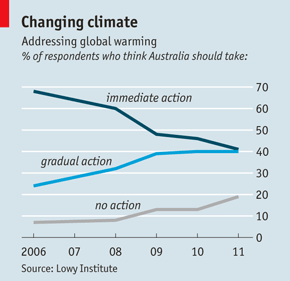
BardCEP graduate students and Director Goodstein spoke with Seb Henbest this past week, manager of Bloomberg New Energy Finance’s operations in Australia, as part of the ongoing National Climate Seminar series. Mr. Henbest has been working for BNEF since 2008 leading the company’s analysis on the carbon markets in the region and developing BNEF’s carbon reduction scheme. Mr. Henbest laid out the political evolution of the debate around climate change in Australia and how recent political changes lined up in favor of a national carbon tax.
In Australia, climate change legislation has been on the national agenda since the previous administration of Kevin Rudd who called it “the greatest moral challenge of our time”. Nevertheless, Mr. Rudd and his successor Julia Gillard were unable to make any progress at achieving emissions reductions. The hung parliament created after the 2010 federal elections however, created the perfect political storm to allow the passage of a carbon tax. Following the 2010 elections, the minority government of prime minister Gillard was forced to seek the support of the Green party which had gained seats in both houses of parliament. In exchange for their support, Gillard agreed to champion a new climate change initiative including a carbon tax. With the support of the Greens and a few independents, Ms. Gillard has laid out her plan to tax 500 of Australian’s biggest polluters beginning in July 2012 for each ton of carbon emitted.

In a Bloomberg New Energy Finance press release, Mr. Henbest explained that, “The
way the system has been designed means that from 2015‐16 the Australian carbon price is likely to be driven by the cost of buying credits from the international market. As demand from the EU ETS [Emissions Trading System] slows however we expect the international carbon price to fall below the Australian price floor.” The Bloomberg press release calculated that the per ton emissions tax in Australia will “likely to decline from AU$25 in 2014‐15 to AU$16 in 2015‐16 with the start of the traded market,” therefore lowering the cost of emissions trading to the Australian economy.

Recent extreme weather events in Australia including cyclones, flooding and the ten-year drought, have served to focus the nation’s attention on the effects of climate change, even if these natural disasters cannot be completely attributed to this process. Concurrently however, the national mood has been changing. Over the past five years, the percentage of Australians in favor of taking immediate action re climate change has noticeably declined as more of the public has come out in support of the government taking no action as noted in the Economist.
With the UN Framework Convention on Climate Change (UNFCCC) set to hold the 17th Conference of the Parties in Durban, South Africa next week, the success of Australia will surely be looked to as a potential model for other countries looking to pass similar carbon tax legislation. The meeting will also serve as the 7th Meeting of the Parties for the Kyoto Protocol.
The next National Climate Seminar is scheduled for December 7th with author and journalist Mark Hertsgaard, for a conversation entitled “Hot: Living Through the Next Fifty Years on Earth.” Mark Hertsgaard has investigated global warming for outlets including the New Yorker, NPR, Time, Vanity Fair, and the Nation. For more information on the National Climate Seminar please see the NCS website. Podcasts of the conversation with Seb Henbest Alley and of previous NCS conversations are available here. The C2C Fellows program kicks off the weekend of December 2nd-4th with the Northeast Launch Workshop and keynote speaker Majora Carter at the campus of Bard College.
